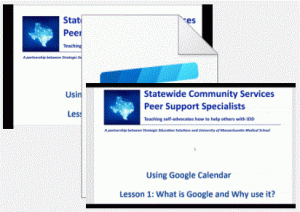“The program you’re building will give us the many hands we need to make this work…lighter for those struggling under the system and fighting to improve it.”
Alex Bradley
Alex Bradley served on our Complex Mental Health Survey Workgroup. Their job was to help make our needs assessment survey easier to read and answer. Alex lives in a rural community outside of the Dallas-Fort Worth Metroplex. She has Aspergers, ADHD, Auditory Processing Disorder, C-PTSD, and chronic depression. She also has several chronic, invisible, rare diseases. She is the President of The Self-Determination Group and a member of the Board of Texas Advocates. Alex enjoys reading, watching YouTube videos, and playing PC video games. Before the pandemic, when she had the time and space, she also enjoyed quilting, sewing, and swing dancing.
Q: What are some of your hopes for the future?
A: Short term goals are finding a clean, safe place to live when my lease is up, getting more hours at work, getting better medical treatment now that I’ve finally gotten health insurance. It’s going to take an incredible amount of work and luck, but I hope in the next few years I’ll be able to go back to grad school. I’ve always wanted to be a scientist.
Q: What are some challenges you have as a person with both a disability and mental health conditions?
A: The social safety net in Texas is nearly non-existent. I usually have several days a month where I can’t get my psych meds that I spend in withdrawal. It’s bad enough that my coworkers have a saying that “25% of an Alex is better than no Alex!”
Q: What was your favorite thing about working on this project?
A: It was honestly really wonderful to see how much you all cared about our perspectives and experiences, and how you really listened and integrated the information we gave you to make a better survey. Not only does the finished product make sense to neurodiverse people, written in literal language we can all understand without any double meanings, but the way the answers are structured will give the scientific community meaningful data about our struggles so they can figure out how to really help us.
Q: Did you feel you were listened to? How do you feel your contribution will improve this project/topic?
A: I very much felt listened to. I think personally my most effective contributions were giving the autistic perspective and giving feedback on how changing the phrasing and order of the questions in the mental health survey is going to affect how people answer them so that the researcher will have better quality data at the end.
Q: How do you think this project will help other self-advocates?
A: Mentorship is an extremely important aspect of advocacy work, for any cause. It gives people community, a connection to the otherwise untaught history of the movement, an understanding that progress was made before and can be made again. Specifically with the disability movement, it shows you all the ways you can advocate for yourself and others despite your individual setbacks. You can learn how to get your message across, how to speak to power, even when you’re nonverbal.
Q: Is there anything else you want to tell us about the project and your work?
A: I’m really glad you guys decided to do this work in Texas, specifically. Our state has a lot of work that needs to be done before disabled people here are treated equitably in society, especially compared to other US states. The program you’re building will give us the many hands we need to make this work not just lighter for those struggling under the system and fighting to improve it, but in some cases will make the work just possible. One of the reasons our voices are ignored is because we aren’t effectively speaking together, and I think your program will help immensely with that.
Check out The Self Determination Group on Facebook and Texas Advocates’ website. We’d love to have you join us!






